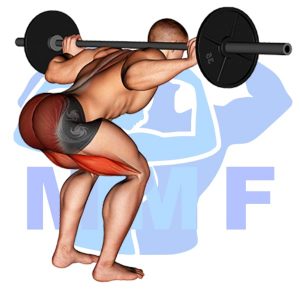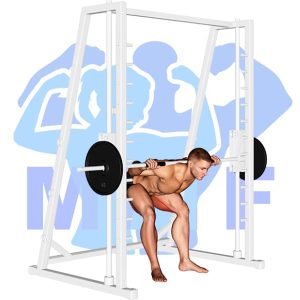Are you tired of doing endless crunches, but seeing minimal results? Have you been looking for a way to target those stubborn love handles and strengthen your core? Look no further than the twisting crunch. It’s a common issue: we want that toned and defined midsection but struggle to find exercises that actually work. This is often because we’re not targeting our oblique muscles. Fortunately, by incorporating twisting crunches into your workout routine, you’ll be able to effectively work those muscles. In this post, we’ll show you the proper form and technique, along with variations and modifications that will help you take your fitness to the next level. Say goodbye to lackluster results and hello to a stronger core with the twisting crunch.
Twisting Crunch Summary
- Primary Muscles: Obliques
- Secondary Muscles: Quadratus lumborum, Psoas major, Iliocastalis lumborum, and Iliocastalis thoracis
- Equipment: Body Weight
- Mechanics Type: Isolated
- Force: Pull
- Utility: Auxiliary

Twisting Crunch Instructions
- Lie down with your back on a mat and your lower legs bent with your feet flat.
- Place your hands behind your head.
- Flex and twist your abs to raise your torso and one leg bringing your knee and opposite elbow together.
- Return your shoulders and leg to the starting position.
- Alternate by working your other-sided
- Repeat your Twisting Crunch for a set of 10-20 reps per side.
Video Tutorial
Twisting Crunch Muscles
Target (Agonist)
Synergists
- Quadratus lumborum
- Psoas major
- Iliocastalis lumborum
- Iliocastalis thoracis
Dynamic Stabilizers
- None
Stabilizers
- Latissimus Dorsi
- Teres Major
- Pectoralis Major – Sternal
- Pectoralis Minor
- Rhomboids
- Levator Scapulae
- Trapezius – Lower
- Triceps – Long Head
- Brachialis
- Brachioradialis
- Biceps Brachii
Antagonist Stabilizers
- None

Benefits of Twisting Crunch
The Twisting Crunch is an excellent exercise for strengthening the oblique muscles. By twisting your torso and crunching your upper body, this exercise forces the obliques to work harder than a regular crunch and helps to build stronger core muscles. Doing this exercise on a regular basis can help to build a strong and defined midsection, and increase overall strength and stability. Furthermore, performing the Twisting Crunch can help to improve posture, balance, and flexibility.
Tips for Performing Twisting Crunch
If you’re looking to take the twisting crunch to a new level, then you’re at the right place. Using these suggestions will enable you to take full advantage of this amazing workout. Concurrently with building your obliques muscles, improving movability, and also a reduced possibility of injury can all be achieved with this exercise. So let’s get begin and look at what these tips can accomplish for you.
- Keep your back flat and your chest up: Make sure you keep your back flat against the ground and your chest lifted throughout the exercise. This will help engage your core and make sure you’re getting the most out of the twisting crunch.
- Don’t forget to twist: The twisting crunch is all about the twist, so don’t forget to twist your torso as you crunch. This will help work your obliques and give you an extra core workout.
- Slow and steady wins the race: Don’t rush through the exercise. Go slow and steady to make sure you’re engaging all of your muscles. This will help you get the most out of the exercise, and get fit faster.
Benefits and Tips Video
Frequent Mistakes To Avoid
When performing twisting crunch, keeping away from typical errors is key to achieving optimal results and preventing pain. Additionally, achieving optimal results from this exercise requires proper technique, and making sure you don’t perform typical errors can help you to perform the exercise correctly and obtain your desired results. Don’t worry, though, it’s not at all difficult as it may seem. You can execute the exercise safely and effectively by avoiding the mistakes to prevent and by following the proper steps. So it is time for you to optimize the impact of this exercise and enjoy the advantages of a successful workout.
- Not engaging the core muscles: Twisting crunches require the abdominal muscles to be engaged in order to perform the exercise correctly and effectively. Without engaging the core, the exercise will not provide the desired results.
- Not keeping the spine aligned: Maintaining proper form is essential when performing twisting crunches. Keeping the spine aligned while performing the exercise will help reduce the risk of injury and maximize results.
- Not controlling the movement: Performing twisting crunches too quickly can reduce the effectiveness of the exercise and increase the risk of injury. Controlling the movement and maintaining good form throughout the exercise will help ensure maximum results with minimal risk.
Find More Bodyweight Exercises Here
Variations and Complementary Exercises
If you want to add some variations to the Twisting Crunch exercise, there are a few different options you can try. Below are some alternative, complementary, or variations exercises for the Twisting Crunch that you can incorporate into your workout routine.
Side Plank Hold

The Side Plank Hold is an excellent complementary exercise to the Twisting Crunch. It works the same muscle groups, but from a different angle, targeting the obliques and the core. The Side Plank Hold is performed by lying on your side with your elbow under your shoulder and your feet stacked. From here, you lift your hips off the ground and hold for 30 seconds. This isometric exercise is great for building strength and stability in the core and obliques, making it a great alternative to the Twisting Crunch.
Side Plank

Side Plank is an effective exercise that can be used as either a complementary or alternative exercise to Twisting Crunch. It is a core-strengthening exercise that works your obliques, the muscles on the sides of your abdomen, and your glutes. To do a Side Plank, start by lying on your side with your feet stacked one on top of the other and your elbow directly beneath your shoulder. Lift your hips off the floor, forming a straight line from head to toes. Hold this position for 30-60 seconds and then switch sides. Side Plank is great for challenging the obliques, which Twisting Crunch may not target as effectively. Plus, it’s a great way to build stability and strength in the core.
Side Crunches

Side crunches are a great complementary or alternative exercise to the twisting crunch. This exercise works the obliques, which are the muscles that run along the side of the abdomen. To perform a side crunch, lie down on your back with your legs bent and your feet flat on the floor. Place one hand behind your head and lift the opposite elbow and shoulder off the ground towards your knee. Hold for a few seconds and then slowly lower your shoulder back to the ground. Repeat on the other side for one set. Side crunches help to strengthen the core muscles, improve posture, and build stability. They are an effective way to target the obliques and can be used as an alternative or complementary exercise to the twisting crunch.
Check Out These Top Bodyweight Exercises
Side Bridge Hip Dip

The Side Bridge Hip Dip is a great complementary or alternative exercise to the Twisting Crunch. This exercise strengthens the core and glutes while engaging the obliques and shoulders. It can be done by lying on one side of your body, propping yourself up on your forearm and elbow, and slowly dipping your hip towards the ground. This exercise should be done with slow, controlled movements and should not be rushed. The Side Bridge Hip Dip is an excellent way to work the same muscles as the Twisting Crunch without putting too much pressure on the spine.
Side Bridge Hip Abductor

The Side Bridge Hip Abductor is a great complementary or alternative exercise to the Twisting Crunch. It is an effective way to target the same muscle groups and strengthen the core, while also providing additional stability and strength in the hips and glutes. The Side Bridge Hip Abductor involves lying on one side, with the bottom leg bent at a 90 degree angle and the top leg straight out to the side. From here, you lift your hips off the ground, hold for a few seconds, and then lower them back down. This exercise is great for increasing balance and coordination while also strengthening the core and lower body.
Horizontal Pallof Press With Bands

The Horizontal Pallof Press With Bands is a great alternative or complementary exercise to the Twisting Crunch. It focuses on strengthening the core muscles, specifically the obliques, and helps to increase stability and balance. This exercise involves standing with your feet hip-width apart and holding a resistance band attached to a stable object. From there, you press your arms out in front of you, then rotate to the side as far as you can while keeping your core engaged. The Horizontal Pallof Press With Bands is an excellent way to target the obliques without putting stress on the spine. It also helps to develop coordination and strength through a full range of motion.
Find More Abs Exercises Here
Opposing Complementary Exercises
In order to maximize the effects of the Twisting Crunch, it is important to include exercises that work the opposing muscle groups. This will help to create a balanced workout, and will also help to prevent overworking any particular muscle group. The following exercises are great complements to the Twisting Crunch and will help strengthen the opposing muscles.
Barbell Stiff Leg Good Morning

The Barbell Stiff Leg Good Morning is a great complement to the Twisting Crunch exercise. This exercise works the opposing muscle groups of the Twisting Crunch by targeting the lower back, glutes, hamstrings, and calves. The motion of the Barbell Stiff Leg Good Morning involves bending forward from the hips while keeping your back straight and your legs slightly bent. This exercise is designed to strengthen and stretch your lower body muscles, providing balance and stability to your core. When combined with the Twisting Crunch, this exercise provides a comprehensive full-body workout that targets both the upper and lower body.
Barbell Good Morning

The Barbell Good Morning exercise is the perfect complement to the Twisting Crunch. This exercise works the opposing muscle group of the lower back, glutes and hamstrings. By performing this exercise, it helps to build strength in these areas, as well as improve posture and help protect against potential injuries. Additionally, the Barbell Good Morning helps to increase balance and stability throughout the core, allowing for a more effective and efficient performance when performing the Twisting Crunch.
Smith Machine Good Morning Off Pins

The Smith Machine Good Morning Off Pins is the perfect complement to the Twisting Crunch exercise, as it works the opposing muscle group. It strengthens the posterior chain muscles of the lower back, hips, glutes and hamstrings, while the Twisting Crunch focuses on the obliques and abs. The Smith Machine Good Morning Off Pins helps to counterbalance the twisting motion of the crunch, allowing you to build strength and stability throughout your core. This exercise can also be used to add resistance to your crunches, helping to maximize their effectiveness.
Unleash Your Abs with Twisting Crunch!
If you are looking to strengthen your core, twisting crunches are a great way to do so! Not only do they work your abs, but they also target your oblique muscles. By adding a twist to the traditional crunch, you are engaging more of your muscles and increasing the difficulty of the exercise. This can lead to a stronger and more defined midsection. Remember to keep your core tight throughout the movement and avoid straining your neck by keeping your gaze towards the ceiling.
References: Wikipedia | ExRx.net | PubMed.gov | Comprehensive List of Abs Bodyweight Exercises




